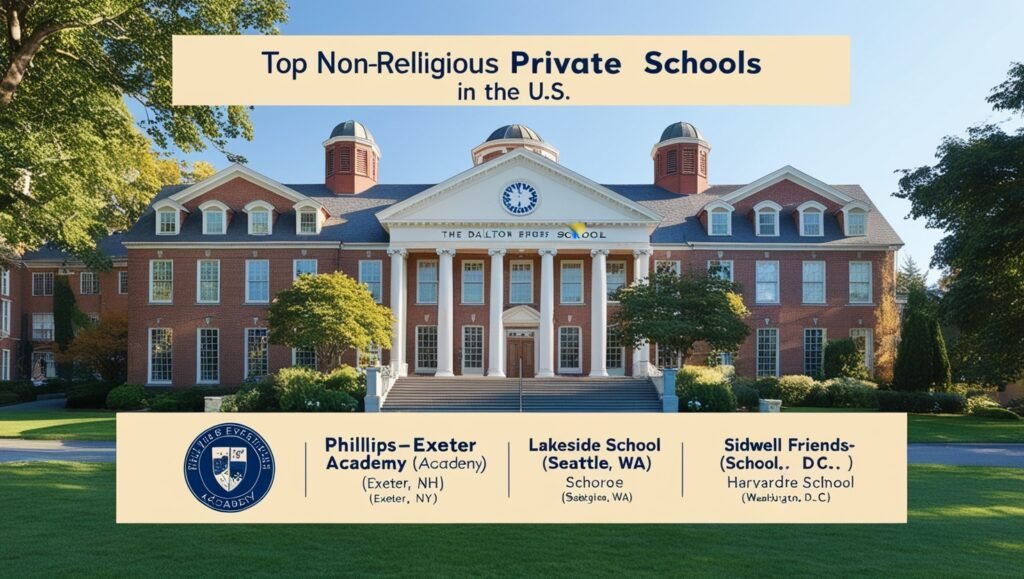Introduction
Choosing the right school for your child is a crucial decision that shapes their academic and personal development. While many private schools are affiliated with religious institutions, there is a growing demand for non-religious private schools that offer a balanced, inclusive, and top-tier education without religious teachings. This article explores the best non-religious private schools in the country, focusing on their unique strengths, curriculum, and the benefits they offer to students and parents.
What Makes Non-Religious Private Schools Stand Out?
Non-religious private schools provide an educational environment that emphasizes academic excellence, critical thinking, and character development without religious influence. These schools attract families who prefer a secular approach to education, ensuring that students receive a well-rounded experience that prepares them for the diverse world beyond the classroom.
Key advantages include:
- Focus on Academic Excellence: With no religious curriculum, more time is dedicated to subjects like math, science, literature, and the arts.
- Diverse Student Body: These schools often attract students from various cultural and socioeconomic backgrounds, promoting inclusivity and mutual respect.
- Innovative Teaching Methods: Many non-religious private schools employ cutting-edge teaching techniques, fostering creativity and critical thinking.
- Extracurricular Opportunities: From sports to arts, non-religious private schools offer a wide range of activities that help students discover their passions.
Top Non-Religious Private Schools in the U.S.
Phillips Exeter Academy (Exeter, NH): Known for its rigorous academic program and strong emphasis on student-led learning.
The Dalton School (New York, NY): Offers a progressive curriculum that encourages independence and intellectual curiosity.
Lakeside School (Seattle, WA): Boasts a balanced curriculum that integrates technology, arts, and athletics.
Sidwell Friends School (Washington, D.C.): While historically Quaker, this school now emphasizes inclusivity and non-sectarian education.
Harvard-Westlake School (Los Angeles, CA): Provides a challenging academic environment with a wide array of extracurriculars.
How to Choose the Right Non-Religious Private School
- Academic Reputation: Look for schools with a strong track record of academic achievement and college placements.
- Curriculum: Ensure the school offers a comprehensive and diverse curriculum that aligns with your child’s interests and future goals.
- Extracurriculars: Choose a school that provides a variety of extracurricular activities, helping your child develop a well-rounded skill set.
- Location and Community: Consider the school’s location and the type of community it fosters, ensuring it’s a good fit for your family.
- Tuition and Financial Aid: Evaluate the cost of tuition and availability of financial aid to ensure the school is a viable option for your family.
Conclusion:
Non-religious private schools offer a compelling alternative for families seeking a high-quality education without religious affiliation. By focusing on academic excellence, diversity, and innovation, these schools prepare students to succeed in a rapidly changing world. Whether you’re looking for a school with a strong STEM program, a vibrant arts community, or a balanced approach to education, the non-religious private schools highlighted here are among the best in the nation.
Frequently asked questions
What is a non-religious private school?
A non-religious private school is an independent educational institution that offers a secular curriculum, meaning it does not include religious teachings or activities as part of its core program. These schools focus on providing a well-rounded education without the influence of religious doctrine.
How do non-religious private schools differ from religious private schools?
Non-religious private schools do not incorporate religious beliefs or practices into their educational programs, whereas religious private schools often include religious studies, prayers, and other faith-based activities as part of their curriculum.
Are non-religious private schools academically rigorous?
Yes, many non-religious private schools are known for their high academic standards and rigorous programs. They often offer advanced placement courses, honors tracks, and specialized programs that prepare students for college and beyond.
Do non-religious private schools offer extracurricular activities?
Absolutely. Non-religious private schools typically offer a wide range of extracurricular activities, including sports, arts, music, drama, and various clubs, allowing students to explore their interests and develop new skills.
Are non-religious private schools inclusive of all cultures and backgrounds?
Yes, non-religious private schools usually promote diversity and inclusivity, welcoming students from all cultural, ethnic, and socioeconomic backgrounds. They aim to create a respectful and supportive environment for all students.
How do I choose the right non-religious private school for my child?
Consider factors such as academic reputation, curriculum, location, community, extracurricular offerings, and tuition. Visiting the school, talking to faculty, and getting feedback from other parents can also help in making an informed decision.
Do non-religious private schools offer financial aid or scholarships?
Many non-religious private schools offer financial aid and scholarships to make education more accessible to families from different economic backgrounds. It’s advisable to check with the school directly for specific information on available financial support.
Are non-religious private schools accredited?
Most reputable non-religious private schools are accredited by regional or national accrediting bodies, ensuring that they meet specific educational standards and offer a quality education.
Can non-religious private school students get into top colleges?
Yes, graduates from non-religious private schools often attend top colleges and universities. These schools typically have strong college counseling programs and a track record of successful college placements.
What is the average cost of tuition at a non-religious private school?
Tuition costs for non-religious private schools can vary widely depending on the location, reputation, and resources of the school. On average, tuition can range from $10,000 to $50,000 per year, with some schools offering financial aid to offset these costs.


